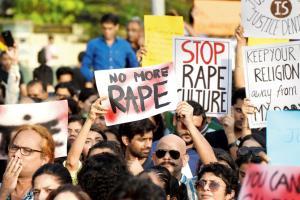Mumbai-born writer Sohaila Abdulali on rape and the narratives surrounding it, ahead of the release of a book written from the perspective of a survivor, author, counsellor, and activist

From blaming hormonal imbalance caused by eating too much chowmein to snide and blatant remarks on the way women choose to dress, more often than not, the discussion on rape is divorced from anything that could help address it and put an end to it. These narratives surrounding rape is what Sohaila Abdulali closely examines and analyses in her new book, What We Talk About When We Talk About Rape, based on her interviews with survivors across five continents.
ADVERTISEMENT
The Mumbai-born writer, who lives in New York and wrote a spine-chilling account of the day she was raped in Chembur 35 years ago, in a magazine, Abdulali is in town today for the release of her book. At the launch this evening, she will discuss the need to re-examine rape culture in a conversation with Bishakha Datta, executive director at Point of View, a Mumbai-based non-profit that works towards strengthening women's voices, and removing barriers to voice, speech and expression. The event is part of PoV's #MadeByWomen series, which makes space for feminist conversations in the city.
Edited excerpts from an interview with Abdulali.

Sohaila Abdulali
When did you begin work on the book, What We Talk About When We Talk About Rape?
In September 2017. And finished my first draft in March 2018, but really, it is the culmination of decades' worth of thinking about the issue in between doing other things.
How did the idea of travelling across five continents to meet rape survivors materialise? What were some of the similarities and dissimilarities that emerged from your experiences across diverse cultures?
I didn't travel everywhere. Many interviews were by phone or on Skype. There were differences across cultures, of course (like calling a survivor zinda laash vs spoiled goods) but I found the similarities more surprising and compelling. If you take away the veneer of cultural differences, silence, shame, and unresolved trauma are pretty universal.
Being a survivor, did you find a difference in how survivor accounts are documented from the way you chose to do it?
Yes. The few books I've seen are mostly either solely personal, or solely academic. I mixed things more by combining research and interviews with my story and opinion.
While rape laws in India have been made stricter, what needs to be done at the level of society and investigative agencies?
Everything remains to be done! Laws need to be applied equitably (an impossible task in an unequal society), and we all need to take on board that we all contribute to rape culture in many ways.
What do we ought to talk about when we talk about rape?
The plurality of women's experiences and reactions — there is no one correct way to respond. Also, that it is ordinary men who rape, not Monsters Out There.
On: Today, 7 pm to 8.30 pm
At: G5A Foundation for Contemporary Culture, Mahalaxmi.
RSVP: info@g5a.org
Log on to: Point of View on Facebook
Catch up on all the latest Crime, National, International, and Hatke news here. Also, download the new mid-day Android and iOS apps to get the latest updates
 Subscribe today by clicking the link and stay updated with the latest news!" Click here!
Subscribe today by clicking the link and stay updated with the latest news!" Click here!






